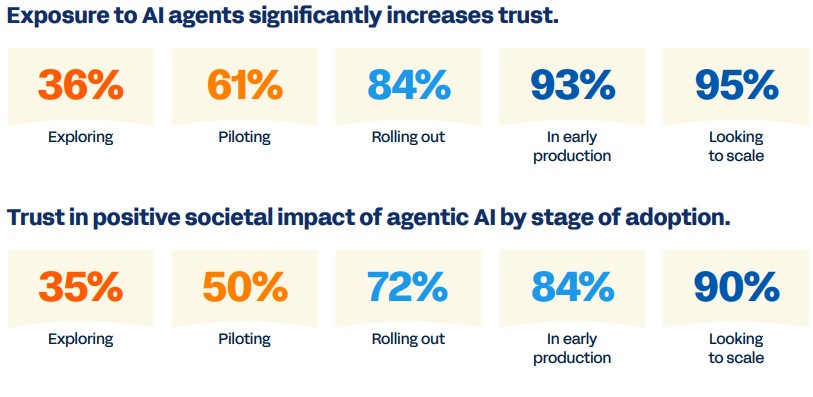
‘Optimism in agentic AI is forged through clear boundaries,' says expert on exploring AI's full potential

While optimism about artificial intelligence (AI) agents is fuelling rapid adoption across the workforce, significant boundaries remain regarding their role in management and decision-making, according to a recent report.
Specifically, 75% of workers globally are comfortable teaming up with AI agents, but only 30% say they are comfortable being managed by one, reports Workday.
Over eight in 10 (82%) organisations are expanding their use of AI agents, with 88% of respondents believing these tools will ease workloads and boost productivity. However, only 30% of employees are comfortable being managed by AI agents, despite 75% expressing comfort working alongside them. Fewer than half (45%) agree that AI agents will become true members of the workforce.
“Optimism in agentic AI is forged through clear boundaries,” says Kathy Pham, vice-president of AI at Workday. “These boundaries, defined by our choices, are essential for purposeful and responsible deployment, freeing us to explore AI’s full potential without fear of misuse.”
Organisations are rapidly integrating AI into core business functions, but governance practices have not kept pace, according to a report.

While AI agents are seen as powerful tools for innovation and efficiency, employees are wary of ceding too much authority, according to Workday’s survey of 2,950 full-time decision-makers and software implementation leaders across three key regions: North America (706), APAC (1,031), and EMEA (1,213).
Only 40% are comfortable with AI making critical financial decisions, and just 24% are at ease with AI operating in the background without their knowledge. Concerns persist about the impact of AI on critical thinking, human connection, and ethical standards, finds Workday.
Despite these reservations, the majority of respondents expect AI agents to deliver tangible benefits, including improved employee growth and development (85%), better work-life balance (80%), and higher job satisfaction (79%). Over half (56%) anticipate a return on investment within 12 months.
The report identifies HR as a key area poised to benefit from AI agent adoption, particularly in forecasting and planning (84%), scheduling and labour optimisation (80%), and time and attendance management (75%). However, tasks requiring personal judgement—such as recruiting and compensation strategy—are seen as less suitable for AI, reflecting ongoing caution.
In the finance sector, 76% of respondents believe AI agents will help address the shortage of CPA and finance professionals. The technology is expected to have the most significant impact on forecasting and budgeting (32%), financial reporting (32%), and fraud detection (30%).
Nevertheless, there is a strong preference for human oversight in compliance, risk management, and legal governance, with 45% of finance professionals favouring human control over these sensitive areas.
“We’re at a turning point where AI agents are no longer just tools—they’re becoming teammates, and in some cases, managers,” says Steve Chase, vice-chair, AI and Digital Innovation, KPMG.
“That shift is creating real tension: people are open to working with agents but far less comfortable being led by them. It’s a signal that while the tech is ready, our workforce is still catching up. But as agents take on more execution, human judgement, empathy, and ethics only become more essential. In this new era, leadership isn’t about span of control—it’s about how effectively you scale intelligence to drive value.”
Canadian businesses could face an uphill battle harnessing AI as new research reveals the country’s workforce trails much of the world in both confidence and literacy related to AI systems.